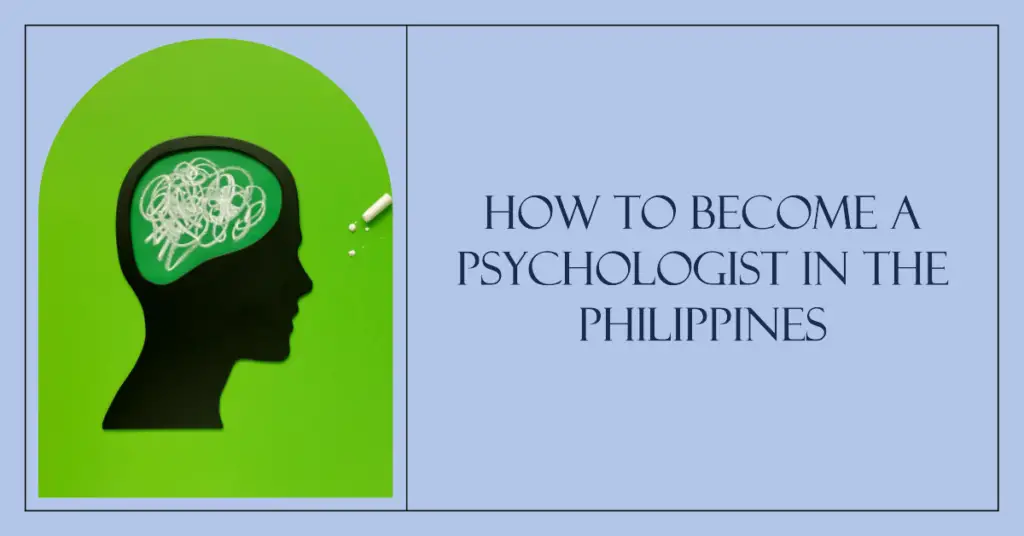Becoming a psychologist in the Philippines requires extensive education, training and licensure. This comprehensive guide examines the step-by-step process – from undergraduate degrees to board exams and specializations.
Educational Pathways to Becoming a Psychologist
The journey begins by pursuing relevant undergraduate and graduate degrees.
Bachelor’s Degree
An initial step is completing a Bachelor of Science or Bachelor of Arts in Psychology, which takes 4 years. Coursework covers psychological theories, human behavior, research methods and testing principles. Graduates gain foundational knowledge to build on through further education.
When selecting a university, consider factors like quality of education, location, costs and psychology board exam passing rates. Both traditional and online colleges offer undergraduate psychology programs. Some students enroll in review centers for extra preparation.
Master’s Degree
After a bachelor’s degree, aspiring psychologists pursue a Master of Arts or Master of Science in Psychology, taking 2-3 years. Programs provide advanced training in specific domains like social psychology, developmental psychology, cognitive psychology and more.
Master’s students conduct original research projects and may complete supervised practicum experiences in clinical settings. Their thesis represents a major component assessing their research, analysis and writing abilities.
Doctorate Degrees
Clinical psychologists take their education furthest, investing 4-7 years in a doctorate program like a PhD or PsyD. Extensive clinical practicums prepare them for professional practice.
Doctoral candidates develop expertise in diagnosis, psychological testing, therapy and treatment planning. Their dissertation project reflects mastery over rigorous independent research.
Licensure Examination for Psychologists
After postgraduate studies, the culmination of formal training is passing the Psychologist Licensure Examination administered by the Philippine Professional Regulation Commission (PRC).
This board exam evaluates candidates’ knowledge across core domains like personality theories, abnormal psychology, assessment methods and counseling techniques. Qualified examinees must be Filipino citizens holding at least a master’s degree in psychology with sufficient practicum experience.
Successfully passing the licensure exam is mandatory for registration as a professional psychologist. It represents a major milestone transitioning from academic preparation to applied practice.
Specializations Within Psychology
Once licensed, psychologists can specialize in diverse fields catering to their unique interests and skills.
Popular career paths include:
- Clinical Psychology: Assess and treat mental, emotional and behavioral disorders.
- Counseling Psychology: Help individuals cope with personal challenges and achieve goals.
- Educational Psychology: Enhance teaching and learning processes through human understanding.
- Industrial-Organizational Psychology: Optimize workplace environments, productivity and employee wellbeing.
- Research Psychology: Design and conduct scientific studies expanding human knowledge.
Specializations allow focusing one’s expertise while meeting societal needs. However, most psychologists maintain core capabilities like conducting therapy, assessments and research.
Importance of Continuing Education
Due to psychology’s constantly evolving nature, lifelong learning is crucial for practising psychologists. Updating knowledge ensures ethical, effective practice.
Continuing education allows integrating new research findings, innovations and best practices. Enhancing niche skills also sustains career development opportunities.
Regular professional training is often mandatory for license renewals. By committing to lifelong learning, psychologists provide optimal services while advancing the field’s frontiers.
In summary, becoming a psychologist in the Philippines requires extensive formal education across undergraduate, postgraduate and professional licensing phases. Specializing one’s expertise then allows fulfilling societal needs while continuously developing through ongoing training. With passion and diligence, aspiring psychologists can gain the rewards of enriching lives through practice and research.
Frequently Asked Questions About How To Become a Psychologist in the Philippines:
Q: How long does it take to become a psychologist in the Philippines?
A: The educational pathway involves around 8-12 years including a 4-year bachelor’s degree, 2-3 year master’s program and licensure exam. Clinical psychologists invest up to 7 years in doctorate studies.
Q: What undergraduate degree is required to become a psychologist in the Philippines?
A: Aspiring psychologists need a 4-year Bachelor of Science or Bachelor of Arts in Psychology covering foundations like human behavior, research methods and psychological testing.
Q: What is the licensure exam for psychologists in the Philippines?
A: The Psychologist Licensure Examination is administered by the Professional Regulation Commission to test knowledge areas like personality theories, abnormal psychology and counseling.
Q: What are the eligibility requirements for the Psychologist Licensure Exam in the Philippines?
A: Applicants must be Filipino citizens with at least a master’s degree in psychology and 200 hours of supervised practicum experience. Good moral character is also required.
Q: What are the major specializations within psychology in the Philippines?
A: Popular branches are clinical, counseling, educational, industrial-organizational and research psychology catering to diverse interests and skills.
Q: Why is continuing education important for psychologists in the Philippines?
A: Regular training updates knowledge and skills to provide ethical, effective services aligned with the field’s ongoing advances and innovations.
Q: What undergraduate psychology courses are offered in the Philippines?
A: Common Bachelor of Science/Arts in Psychology programs covering theories, human behavior research, testing principles and related domains.
Q: What are the costs for getting a psychology degree in the Philippines?
A: Tuition fees vary by school and degree level, with public schools generally cheaper than private institutions. Review centers provide additional exam prep.
Q: What psychology graduate degree options exist in the Philippines?
A: Master of Arts/Science in Psychology programs take 2-3 years. Doctorate degrees like PhD/PsyD take 4-7 years for clinical psychologists.
Q: What skills are required to become a psychologist in the Philippines?
A: Key skills include listening abilities, problem-solving, understanding human behavior, caring attitude, perceptiveness, and patience.
Q: What are the career options for psychology graduates in the Philippines?
A: Graduates can become lawyers, social workers, professors, or pursue other fields like education leveraging their knowledge of human behavior.
Q: Can Filipino citizens study psychology degrees online?
A: Yes, many accredited Philippine universities offer online psychology degrees at the bachelor’s and master’s level.
Q: Where can Filipino psychology graduates find job vacancies?
A: JobStreet, LinkedIn and online job boards list openings for psychologists and related roles at healthcare facilities, schools and private practices.
Q: What professional organization oversees psychology regulation in the Philippines?
A: The Professional Regulation Commission handles licensing and practice standards for psychologists across the country.
